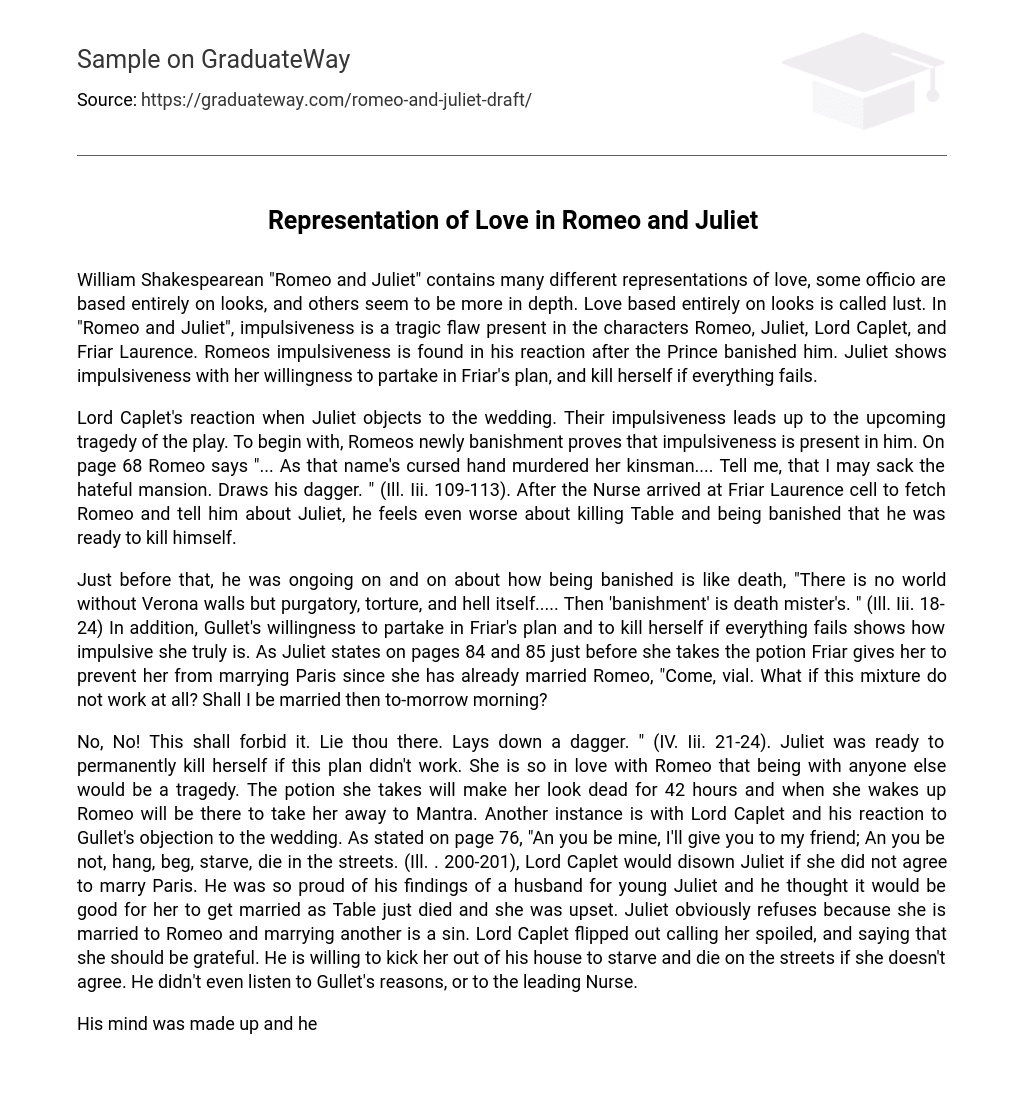William Shakespearean “Romeo and Juliet” contains many different representations of love, some officio are based entirely on looks, and others seem to be more in depth. Love based entirely on looks is called lust. In “Romeo and Juliet”, impulsiveness is a tragic flaw present in the characters Romeo, Juliet, Lord Caplet, and Friar Laurence. Romeos impulsiveness is found in his reaction after the Prince banished him. Juliet shows impulsiveness with her willingness to partake in Friar’s plan, and kill herself if everything fails.
Lord Caplet’s reaction when Juliet objects to the wedding. Their impulsiveness leads up to the upcoming tragedy of the play. To begin with, Romeos newly banishment proves that impulsiveness is present in him. On page 68 Romeo says “… As that name’s cursed hand murdered her kinsman…. Tell me, that I may sack the hateful mansion. Draws his dagger. ” (Ill. Iii. 109-113). After the Nurse arrived at Friar Laurence cell to fetch Romeo and tell him about Juliet, he feels even worse about killing Table and being banished that he was ready to kill himself.
Just before that, he was ongoing on and on about how being banished is like death, “There is no world without Verona walls but purgatory, torture, and hell itself….. Then ‘banishment’ is death mister’s. ” (Ill. Iii. 18-24) In addition, Gullet’s willingness to partake in Friar’s plan and to kill herself if everything fails shows how impulsive she truly is. As Juliet states on pages 84 and 85 just before she takes the potion Friar gives her to prevent her from marrying Paris since she has already married Romeo, “Come, vial. What if this mixture do not work at all? Shall I be married then to-morrow morning?
No, No! This shall forbid it. Lie thou there. Lays down a dagger. ” (IV. Iii. 21-24). Juliet was ready to permanently kill herself if this plan didn’t work. She is so in love with Romeo that being with anyone else would be a tragedy. The potion she takes will make her look dead for 42 hours and when she wakes up Romeo will be there to take her away to Mantra. Another instance is with Lord Caplet and his reaction to Gullet’s objection to the wedding. As stated on page 76, “An you be mine, I’ll give you to my friend; An you be not, hang, beg, starve, die in the streets. (Ill. . 200-201), Lord Caplet would disown Juliet if she did not agree to marry Paris. He was so proud of his findings of a husband for young Juliet and he thought it would be good for her to get married as Table just died and she was upset. Juliet obviously refuses because she is married to Romeo and marrying another is a sin. Lord Caplet flipped out calling her spoiled, and saying that she should be grateful. He is willing to kick her out of his house to starve and die on the streets if she doesn’t agree. He didn’t even listen to Gullet’s reasons, or to the leading Nurse.
His mind was made up and he always seems to get his way. He acted very impulsively as he yelled at Juliet and called her names. Thus, impulsiveness is present in several situations throughout the play. Juliet impulsiveness is in her willingness to kill herself if everything fails and her quick agreement to partake in Friar’s plan. Lord Caplet’s impulsiveness is after Juliet refuses to marry Paris, and Romeos is after he has heard about his banishment from Verona.





